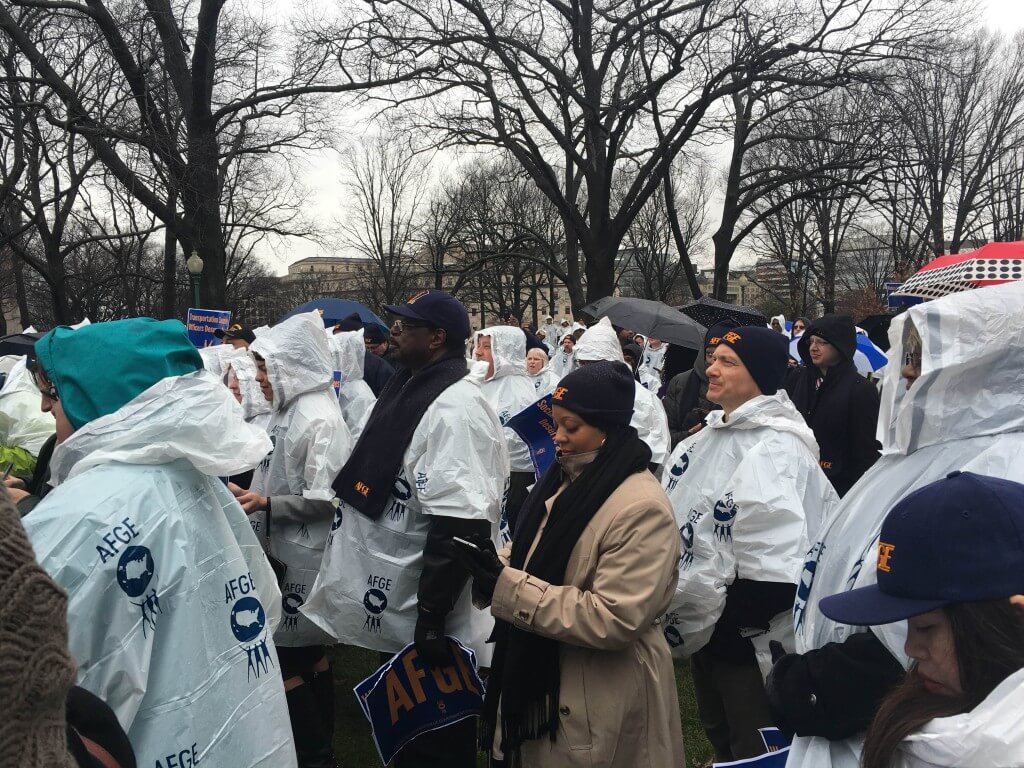
In spite of the rain and cold temperature, union members and activists turned out to support a higher pay raise for government workers.
WASHINGTON – More than 200 federal employees from as far away as California rallied on Capitol Hill on a rainy Tuesday to demand that Congress raise wages for federal workers by 5.3 percent, well above the pay hike proposed by President Barack Obama in his 2017 budget proposal released earlier Tuesday.
“We want the lawmakers to know that if they don’t hear our demands, we’ll vote them out,” said J. David Cox, president of the American Federation of Government Employees, the largest federal employee union representing 670,000 government workers.
The AFGE said its proposed 5.3 percent pay raise would offset the lack of adjustments for inflations and missed raised in the past few years. Obama proposed a 1.6 percent raise, 0.3 percent above the 2016 raise confirmed in the December budget deal.
“I’m a realist. I know that (5.3 percent) number may not fly, but 1.6 percent is just too low,” Cox said. “…We’re going to battle for this more meaningful number.”
With temperatures in the 30s and a steady rain coming down, the union members shared umbrellas while ponchos were given out and Cox exhorted them to lobby hard to get their members’ commitment for a higher raise. Members chanted their demands as lawmakers took to the stage to offer support.
House Minority Leader Nancy Pelosi and other Democratic leaders said it is time to catch up after years of relatively stagnant pay.
“It’s the dignity of our federal workforce at stake,” said Sen. Ben Cardin, D-Md. “We’ve just got to do a lot better.”
The demand for higher pay raises comes after six years of little pay growth – three years of pay freezes and three years of 1 percent raises. In that same time, private sector workers averaged 2 percent in annual pay increases.
Gary Burtless, an economic studies fellow at Brookings Institution, said that although Congress and the White House have only agreed to small pay increases, matching the private sector raises would not make a big dent in the proposed $4.1 trillion 2017 budget. But keeping the pay hike lower, as Obama has proposed, is more politically palatable, he said.
“It’s the kind of thing that goes well with everyday voters that question the work being done in Washington,” Burtless said.
AFGE members have been actively seeking bipartisan support, going door to door in Congress to meet with their local representatives. Cox said that the union is especially targeting Republican lawmakers in areas with high numbers of civil servants.
“We’re really taking on an individual level approach, mobilizing as many people as we can,” said James J. Everett-Rihel, a rating specialist for the Department of Veteran Affairs in Philadelphia.
Everett-Rihel said his congressmen have reacted well to the union’s proposal.
Like Everett-Rihel, Rosie Edwards, a nurse at the St. Albans Veterans Hospital in New York, took time off from work to attend the rally, organizing a bus trip with 25 co-workers.
“The government keeps saying they don’t have enough money for us,” said Edwards, who has been a VA nurse for 30 years. “I love my job, but we work hard and we’re going to continue to fight to get what we have earned.”


